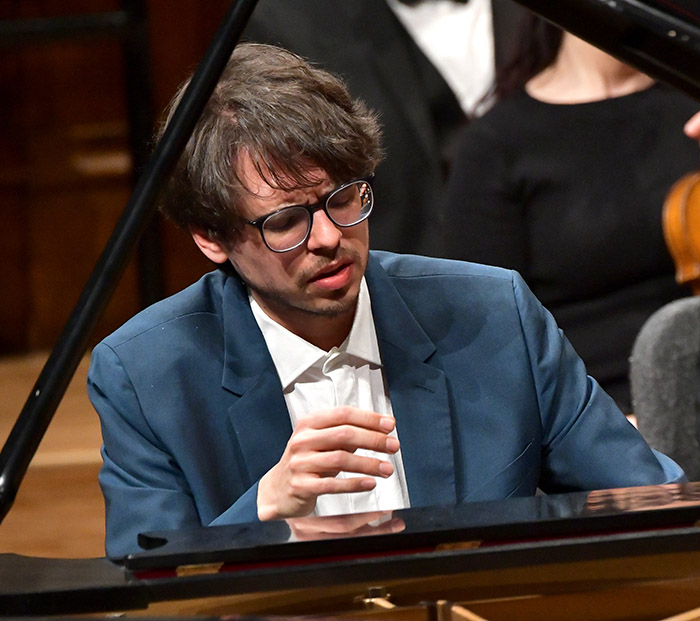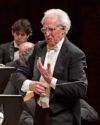Boston Phil’s Brilliant Visegradian Happening

Boston Philharmonic’s theme of geographic connectivity among the three composers on its program at Sanders last night resulted in a concert significantly more interesting than a Trip Advisor’s ‘Three Top Balkan Composers’ excursion.
Zoltán Kodály’s popular Dances of Galánta originated in an ethnomusicological collection. Given the reputation of Kodály, just like that of Bartok, for discovering the genuine and authentic Hungarian folk music, one could expect an encounter with that rough cultural layer. However, the town of Galánta, where Kodály grew up, richly mixed Roma, Jewish, Slavic, and Magyar populations. What young Zoltan remembered from his childhood, and then happily reconstructed in his dances for orchestra, sounded close to what passed along for Hungarian in the 19th century: the familiar style of alla Zingarese. That makes the dances immensely listenable — and when Zander gave us tongue-in-cheek permission to dance in the isles, it did not sound too farfetched. Add on top of that a masterful orchestration and very capable instrumental forces, and you end up with cherishable outing.
“A riveting clarinet solo from the reed of the principal Rane Moore kicked off this delectable feast in the first dance, with the whole orchestra sounding robust and perfectly articulated in the breakneck gypsy rhythms.”
It is hard to find a strong ethnic or nationalistic strain in Liszt’s second piano concerto, premiered in Weimar in 1857, safe distance in space and time from Budapest and its bloody uprising of 1848. It is academic music with strong penchant for innovation, that accordingly received its share of abuse in the long decades that followed. It is still not everyone’s cup of tea, and the fact that Boston Philharmonic never programmed any Liszt before can’t come as a shock. The time to break that spell arrived due to the engagement of a good partner.
Lucas Debargue, who played this concerto in the final round of his successful stint at Tchaikovsky Competition, was just the ticket. In the concerto known for its ambiguous role of the piano — which seems to oscillate between accompanying other instruments and raging on its own — making some sense of the piano line seems to be the best way to make sense of the whole concerto. Debargue provided this core understanding at his first chance: he played the first big piano solo that ascends from chthonic rumblings with deliberate tension and seriousness. Whatever monstrous hero was being born in front of us, crawled out of his primordial mess with difficulty and determination. This sense of seriousness shone a light on the whole concerto, as it jumped between extremes. A sweet cello solo, beautifully played by the principal Rafael Popper-Keizer, got dutifully swept away by the monstrous march, crass enough despite lack of power in the brass section. This nasty transformation of a perfectly benign main theme carries a long tradition of alienating listeners. But it all magically made sense this time.
Debargue responded to the warm audience reception with two encores: Milosz Magin’s small polonaise Nostalgie du pays, and a very idiosyncratic Scarlatti’s Sonata, K. 24 in A Major. After the short, albeit very memorable concerto and the two encores, his visit adds up to only a teaser, leaving the piano aficionados to count days until a more substantial visit. In the meantime, repeat performances on Saturday and Sunday are in the offing.

Zander and the orchestra triumphed with the Dvořák’s Seventh. This treasure trove of Bohemian nationalist tunes, multiplied by Brahms-worthy orchestration, shone from every quarter, with horns and flutes particularly rewarding this listener’s ear and with all string sections providing even and robust support throughout.
Zander’s brief introductory remarks with musical illustrations proved engaging and to the point. In an ideal world, listeners would have the time and attention span to get the same or better information from their program notes. After this one, though, I hush away the least inkling of snobbism about music appreciation lessons and salute Zander’s extremely valuable efforts.
 Victor Khatutsky - The Boston Musical Intelligencer
Victor Khatutsky - The Boston Musical Intelligencer